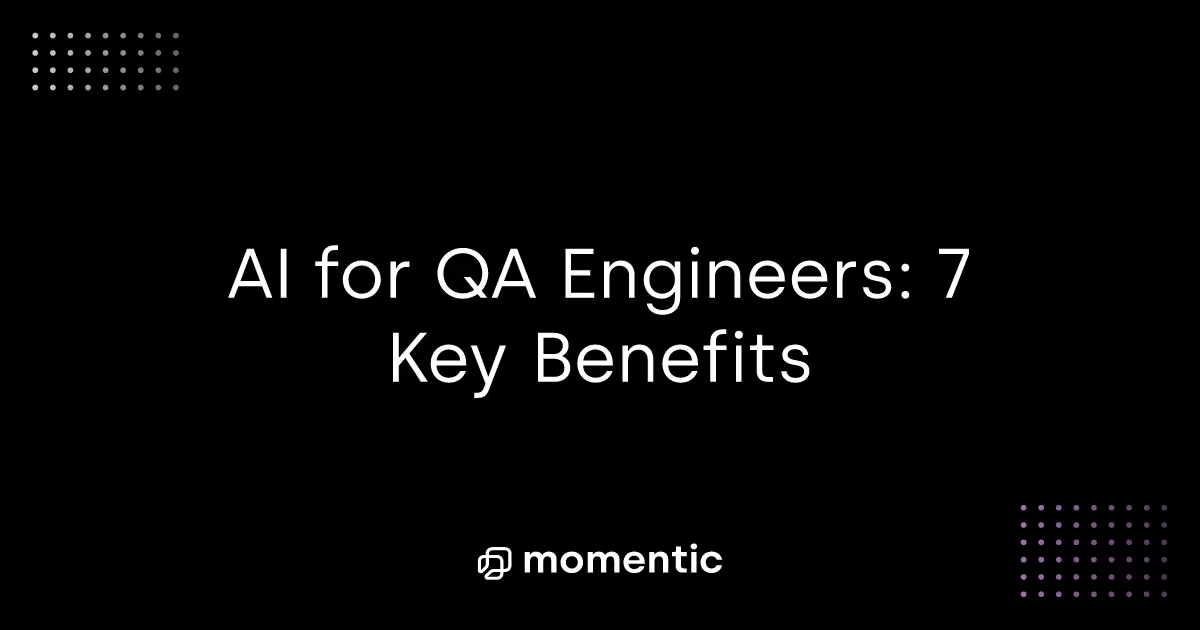AI for QA Engineers: 7 Key Benefits
Why your next investment area should be AI for QA engineers - 7 top transformational abilities


A recent survey of DevOps professionals ranked testing as the most impactful area for AI investments across the delivery cycle, above planning, coding, deploying, and releasing.
In many ways that's not surprising.
Software QA is filled with exactly the type of tasks that humans do poorly, and machines do well
- high-volume, repetitive tasks that feel thankless and don't engage the human brain's unparalleled capacity for creativity and problem solving.
AI solutions for QA engineers ultimately allow you to do QA better, and for your human team to reinvest their time into the parts of software engineering that are more rewarding. Everyone wins - and here's how AI makes that happen.
7 Benefits of AI for QA Engineers
1. Faster Test Creation and Execution
This is AI's headline benefit. Ultimately, many of the benefits AI offers QA engineers stem from this one, top-level fact - so it seems like a good place to start.
You get more done with AI testing tools. A lot more. This is due to:
- A suite of features designed to simplify and speed up testing processes, such as natural language test case creation
- The fact that AI can execute complex tests in a fraction of the time a human can
- You can reinvest the time you save in other tasks, for knock-on efficiency gains
We're not just talking minor efficiency improvements either. Here's how much time one of our clients shaved off one of their first tests with our AI platform:
"I just ran our first automated eval across 110 prompts. This would have taken us well over an hour to run manually, and I kicked it off in 5 seconds, and it was done running in 14 min, without me needing to do a thing during that time. HUGE for us."
That's a 75% time saving, if we're being conservative - if we take 'well over an hour' as 1.5 hours, that increases to an 83% time saving.
What could your team do with all that time back?
2. Increased Test Coverage
80% test coverage isn't a pipedream - you can achieve it with an AI testing solution in just a few days.
All those tough decisions you make about resource allocation, and which tests to run based on business and user priorities? You don't need to do that anymore, thanks to:
- Natural language prompts and plain English test case creation
- AI-powered assertions that verify any statement in any application state
- Self healing tests and automatic retries that reduce failed tests
Because AI does so much of the work, you're no longer resource-limited - and because it works so quickly, you're no longer limited by timeframes, even if you run the tightest Agile ship in the world.
You run more tests in a fraction of the time needed for manual testing, with more insight into your code, more defects picked up before production, and amore competitive user experience as a result.
3. More Complex Test Automation
Test automation, in some form or other, has been around for decades now, and the broad methodology behind it has remained the same. Write Selenium scripts for anything simple enough to automate; rely on manual testing for anything remotely complex.
AI solutions for QA testing are blurring - and rapidly erasing - the line between 'simple' and 'complex'. Using platforms like Momentic, you can automate the vast majority of the tests you need to run and generate scripts in minutes, even for complex components like web components, data visualizations, and iframes.
As well as basic functional testing like unit and integration tests, AI allows you to completely automate:
- End to end tests
- Regression tests
- Performance tests
- Response accuracy tests
- Load tests
4. Minimize Test Maintenance Hours
Is test maintenance the most tedious aspect of being a software engineer?
Your answer is probably 'yes', in which case, good news! AI solutions for QA engineers will do it for you, with self healing tests that update with your code changes. You don't even need to tell the software to do it - the AI will heal your tests automatically, without you having to remember.
Your engineers get countless boring afternoons of fixing flaky tests back, which they can dedicate to more valuable and fulfilling tasks instead.
5. Seamless CI/CD and Workflow Integration
AI solutions work however you want to work - the ability to integrate them into your existing ways of working, rather than reconfiguring everything, is one of the greatest things about them.
The rise of CI/CD has left manual QA processes out of sync with how we want development cycles to run. You cannot truly continuously integrate if you're constantly handing code back and forth between separate teams, risking slowdowns and communication errors in the process.
AI solutions for QA engineers offer direct integration with CI providers, including GitHub Actions, CircleCI, and Amazon Linux. This minimizes the time cost of QA processes, allowing you to maximize the benefits of CI/CD - higher software quality, greater market adaptability, and faster time to market.
AI QA solutions also offer the flexibility to fit into your existing development workflows with minimal setup. This includes:
- Complete flexibility over testing environment: test in the cloud, locally, on private networks, or in CI/CD pipelines.
- Control over execution: Schedule with cron or execute programmatically with the CLI
- Out-of-box integration with key workflow tools like TestRails, Zephyr, Qase, Jira, and many more.
Flexible integration options mean that you enjoy the benefits of AI testing without a large-scale implementation project, and the slowdowns those tend to bring along.
6. Predictive Analytics
AI enhances your ability to accurately track useful metrics that help you make improvements in your testing processes. It's much easier to track (for example) defect cycle time or code coverage using an advanced AI tool than doing so manually.
But it goes further than that.
Human pattern recognition skills pale in comparison to the relentless accuracy of machines. As a result, AI QA solutions offer unparalleled opportunities for predictive analytics. Your AI tool can identify potential workflow and resource optimization points that your human engineers may never have noticed on their own.
For example, intelligent AI agents can analyze vast datasets of previous test data to identify patterns in defect occurrence across your app. So your engineers can dedicate more time to problem areas and improve code quality as a result.
42% of DevOps teams expect AI-enabled risk analysis of code changes to become more widespread in the near future. Expect significantly increased adoption in the next year or two.
7. Happier Engineers?
There's always an assumption that implementing AI solutions means laying often tire departments' worth of people. This isn't the case - or doesn't have to be.
Tech businesses have been slimming down their QA teams for years now. You're more likely to have a few internal QA engineers than a large team - and this places a huge volume of work and responsibility in the hands of a few.
Combine this with the fact that QA is tedious and repetitive work for human minds, and you have the perfect conditions for engineer job dissatisfaction, disengagement, and burnout. And, if you want your employees to stick around, build up an intricate knowledge of your product, and move up the ranks rather than constantly chasing new hires, that's not good news.
Your QA team could be a real asset to your business - but not in QA roles. Automate your software testing processes, and give QA engineers the chance to really showcase their talent higher up the engineering value chain.
Momentic: The AI Solution for Your QA Team?
"Momentic makes it 3x faster for our team to write and maintain end to end tests." - Alex Cui (CTO, GPTZero)
Momentic is an AI testing agent designed to supercharge your testing processes - maximize speed and coverage, minimize time and expense sunk into external QA, and free your engineers to focus on valuable project work.
If, like Alex and his team, you're keen to save over two thirds of the time you spend on key testing processes, why not schedule a conversation with our founder?


